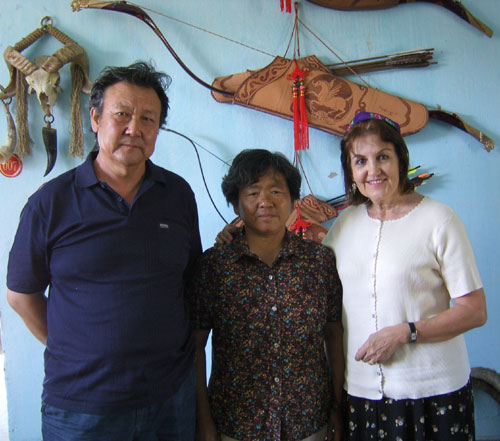By Lisa Carducci
After a 90-minute flight from Urumqi, we landed at the Yining (Gulja) Airport in Ili Kazak Autonomous Prefecture – a green island – where 46 ethnic groups live. I was accompanied to Ili (or Seman) Hotel – headquarters of the Russian Consulate before Liberation, that later became the powerful Nikolai Petrovsky's residence – and we immediately set off for Qapqal ("Chabucha'er" in Chinese) Xibe Autonomous County, 17 km further southwest. The temperature of 27ºC and a sunny blue sky were auspicious signs to me.

There we arrived at Yi Chunguang's place. He shortened his original name, Yilari·Chunguang. Chunguang means "spring light." The house kitten welcomed me along with its master and immediately became very friendly.
Yi Chunguang was the first Xibe (also Xibo) I met. Originally from Dongbei (a name designating the three northeast provinces of the country), they number 120,000 in Liaoning, but Yi said that "there," Xibe don't speak their national language anymore. In Xinjiang, they total fewer, about 33,000, two-thirds being in Qapqal, but their culture still flourishes. Census surveys show that there are Xibe in all the Chinese provinces, even though there are only 18 in Hainan and two in Tibet.
Their written language is derived from Manchu and comprises 108 letters. In fact, to decode the ancient writings found in the Beijing Imperial Palace, six old Xibe were consulted, as they were the only ones who could still interpret Manchu. Few Xibe write in their language today. They have for the most part adopted Chinese, though the Xibe language is still spoken at home. "We Xibe mostly practice Shamanism," Yi explained. "Some are Buddhist. There is no ban on marrying outside the ethnic group and many do. My niece's husband is Han, my three daughters-in-law are Han. So, we end up adopting the Han language, customs, and celebrations, while preserving our own, such as the Bow Festival, on the 18th day of the fourth month," he added.
How and why did the Xibe people arrive in Xinjiang? "Xibe is a people of archers. In 1764, Emperor Qianlong of the Qing Dynasty sent 3,000 to 4,000 Xibe from Shenyang, the capital of Liaoning Province, to defend the northwest borders." Why the Xibe? "Because our ancestors were known for their archery skills. The emperor armed them, writing down the number of arrows for each one – six or eight for soldiers and up to 12 to 20 for officers. When they arrived in Xinjiang, they totalled 4,500." Why such a rise in number? I think they had probably recruited forces along the way, but my interlocutor smiled. "Children were born during the 16-month voyage!" adding, "It was quick, as usually two years were needed to travel the distance."
The route was estimated to be 6,000 km until 2006, when a Chinese person covered it by motorcycle to calculate the exact length, which is now known to be 7,800 km. Part of the route is now in the Mongolia territory. The Xibe moved around on foot or oxen carts. Only the leaders of the group rode a horse, even when fighting. "The Qing Dynasty emperors also sent the Xibe to chase the Burmese from Yunnan, to suppress a rebellion in Sichuan, and to resist the Russian Tsarist invasion. Archery has a history of 30,000 years in the world. For our Xibe ancestors, to bear a scar from an arrow was a decoration and to die from an arrow, an honor.
"We are all descended from these archers," continued Yi Chunguang. "The emperor had told them that in 60 years, they could go back home, but when the deadline came, Qianlong had died and the Xibe had formed roots in Xinjiang."
I observed the man while he talked, punctuating his sentences with short but resounding laughter, and I thought he resembled Ewenki and the Oroqen people. "In fact," he replied, "we northeast people share common features, and also with the Japanese and the Koreans."
As his wife, Jiao Yuxiang, who is seriously diabetic, started to lose her sight at the age of 50 following an incorrect diagnosis 10 years earlier (which cost 60,000 yuan), Yi decided to retire before term, in 1998, to take care of her. Both are now 60. "She is better than many other sick people whose condition is not as bad, because she practices qigong (a technique for vital energy circulation in the body) regularly." In the evenings, Yi likes to sit in the garden and play the accordion for his wife. His cooking skills are not bad, and he even likes to do house chores. When his three sons, their wives, and four children come from Urumqi to spend holidays at home, he takes care of everything. Yi gets a retirement pension of 1,400 yuan a month, which is enough, he said. He could have had more if he had worked at only one place, but he had five jobs during his working life, including farm worker, carpenter, road builder, school attendant. From 1994 to 1996, he conducted business with foreign countries. "Pakistan, Kazakhstan, Tajikistan…. I went to all these countries," explained Yi, who is fluent in six languages.